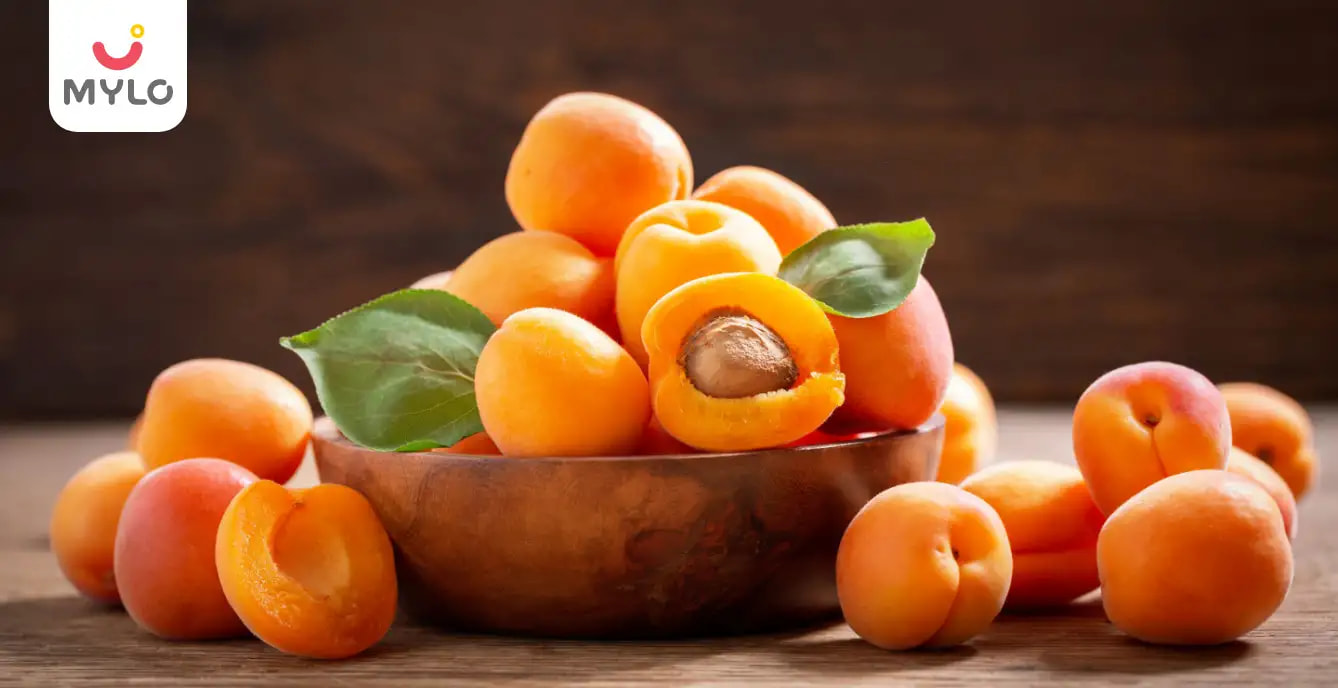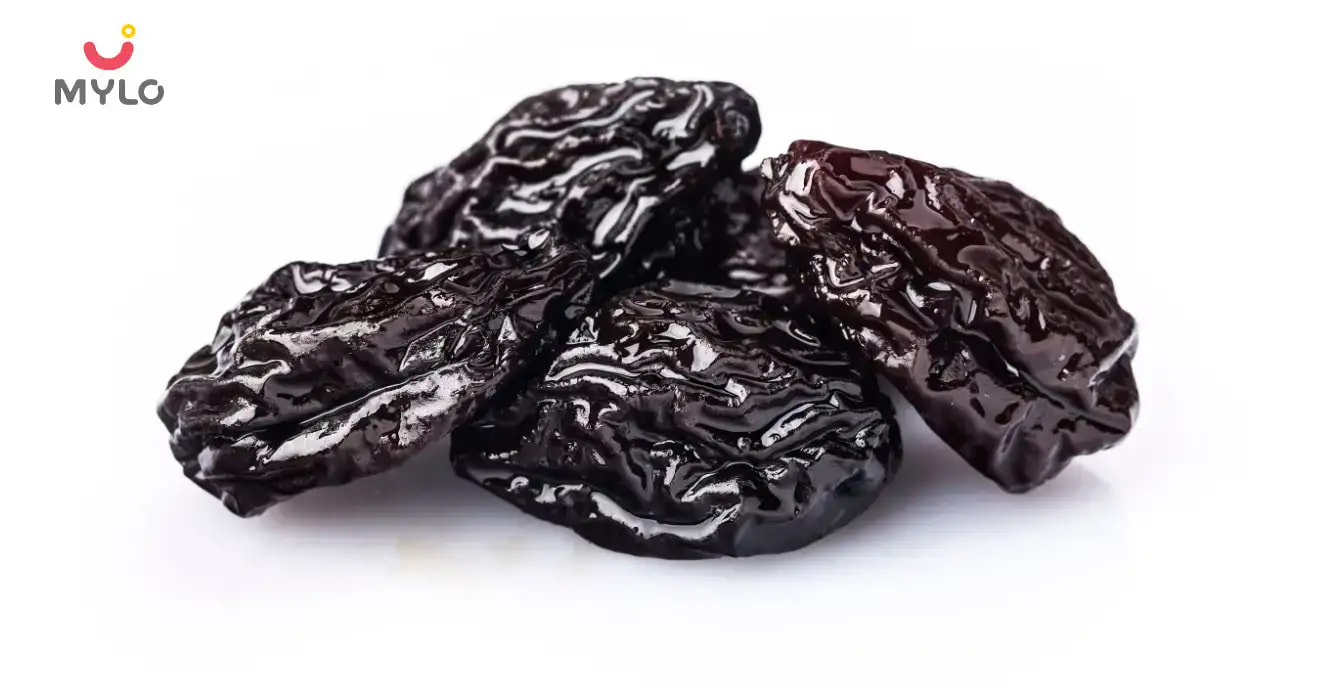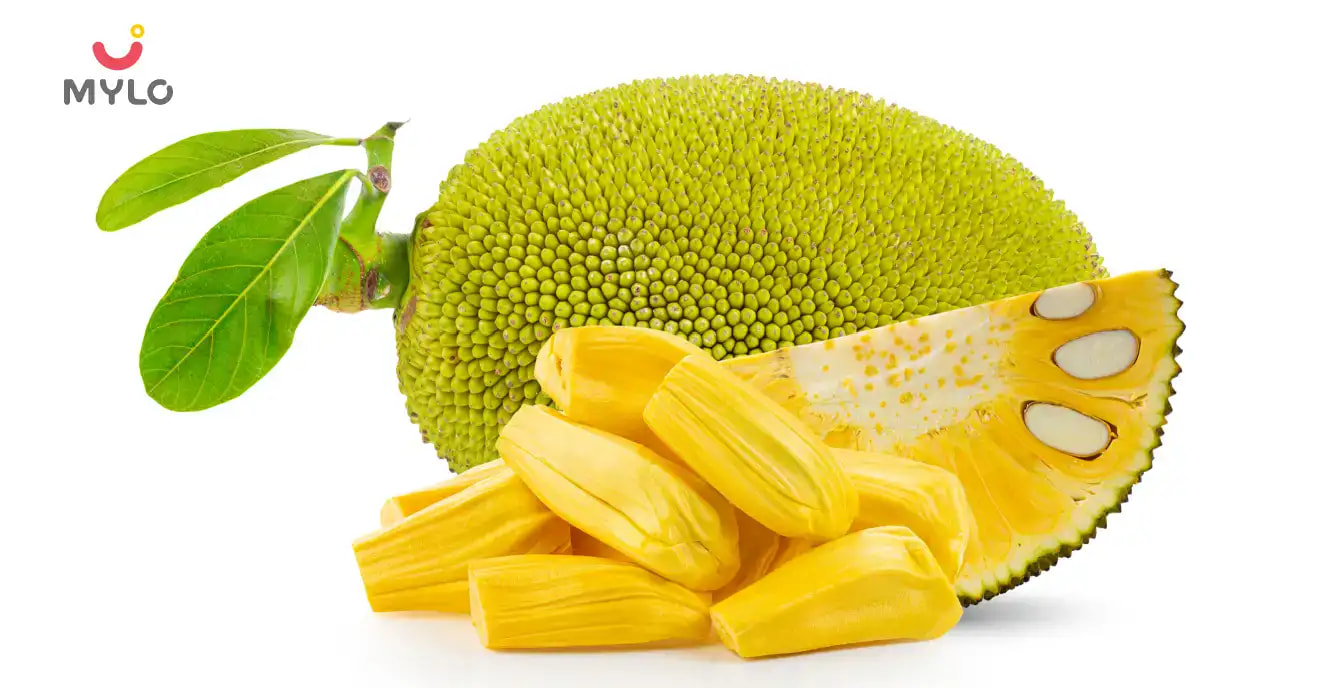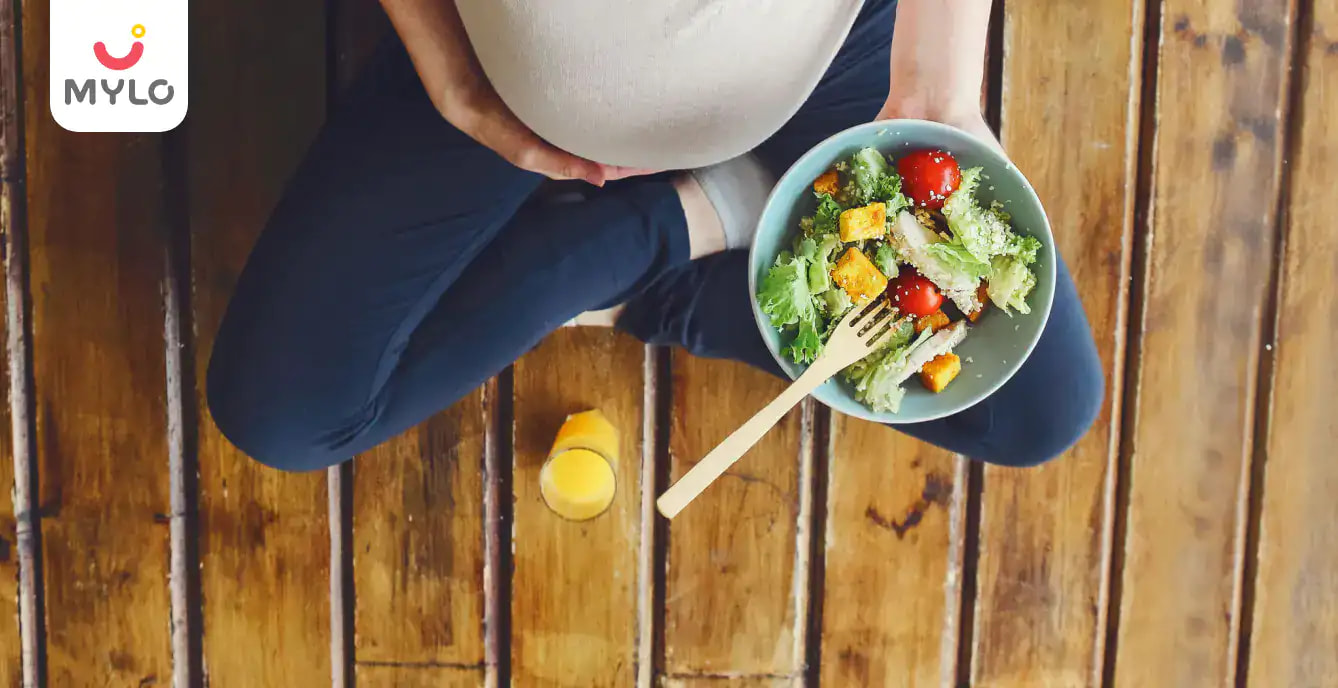Home

Pregnancy Journey

Apricot in Pregnancy: Is This the Superfood You Have Been Looking for?
In this Article

Pregnancy Journey
Apricot in Pregnancy: Is This the Superfood You Have Been Looking for?
Updated on 3 November 2023
Pregnancy is a time of immense joy and anticipation for expectant mothers, as they strive to provide the best nutrition for their growing baby. The quest for a healthy and balanced diet becomes even more crucial during this special phase of life. While there are numerous fruits to choose from, one particular fruit that often goes unnoticed is the humble apricot in pregnancy.
Bursting with flavor and packed with essential nutrients, apricots have gained recognition as a potential superfood for pregnant women. But what exactly makes apricots a powerhouse of nutrients? In this article, we will explore the nutritional benefits of apricot during pregnancy, shedding light on why this fruit might just be the missing piece in your pregnancy diet puzzle.
Nutritional Value of Apricots
Apricots are not only delicious but also packed with essential nutrients, making them an excellent choice for a healthy diet during pregnancy.
Apricots are rich in the following nutrients:
- Calories: 34
- Carbohydrates: 8 grams
- Protein: 1 gram
- Fat: 0.27 grams
- Fiber: 1.5 grams
- Vitamin A: 8% of the recommended daily intake
- Potassium: 90.6 mg
- Phosphorus
- Sodium: 0.4 mg
- Sugars: 3.2 grams
- Vitamin C
- Beta-carotene
- Lutein
With all these nutrients combined, apricots provide a wide range of health benefits for pregnant women.
Is It Safe to Eat Apricot During Pregnancy?
Pregnant women often wonder is apricot good for pregnancy. The good news is that apricots are generally considered safe for consumption during pregnancy, as long as they are washed thoroughly to remove any bacteria or pesticides. However, it is important to consume them in moderation, just like any other food, to ensure a balanced diet. If you have any specific concerns or underlying health conditions, it is advisable to consult your healthcare provider before including apricots in your pregnancy diet.
Raw Apricots vs Dried Apricots in Pregnancy: Which is Better?
The choice between raw and dried apricots depends on personal preference and nutritional needs. Raw apricots are fresh and juicy, providing a satisfying crunch and a burst of flavor. They contain higher water content, which helps keep the body hydrated.
On the other hand, if you’re wondering, is dried apricot good for pregnancy, then dried apricots in pregnancy are a concentrated source of nutrients and energy. They are rich in fiber, iron, and potassium. Dried apricots are also convenient and have a longer shelf life, making them a great snack option for pregnant women on the go.
Ultimately, both raw and dried apricots offer nutritional benefits, so you can choose based on your taste and convenience.
What are Some Common Apricot Benefits in Pregnancy?
Let us uncover some of the benefits you can derive from consuming apricots in pregnancy:
1. Promotes Digestive Health
The fiber content in apricots helps regulate bowel movements and prevents constipation, a common issue during pregnancy. Adequate fiber intake can promote a healthy digestive system and alleviate discomfort.
2. Boosts Immune System
Apricots are loaded with antioxidants, such as vitamins A and C, which strengthen the immune system. A strong immune system is crucial during pregnancy to protect both the mother and the developing baby from infections and illnesses.
3. Supports Fetal Development
The vitamins and minerals found in apricots play a vital role in the healthy development of the baby. Vitamin A contributes to the growth of the baby's organs, while calcium and iron help in the formation of bones and blood cells.
4. Provides Energy
Pregnancy can be physically demanding, and apricots can provide a natural energy boost. The natural sugars in apricots, combined with their nutrient content, can help combat fatigue and keep you energized throughout the day.
5. Regulates Blood Pressure
Apricots are rich in potassium, a mineral known to help regulate blood pressure. Maintaining a healthy blood pressure level is essential during pregnancy to prevent complications such as preeclampsia.
6. Improves Skin Health
The high vitamin C content in apricots contributes to the production of collagen, a protein that supports skin elasticity. Consuming apricots can help pregnant women maintain healthy skin and reduce the appearance of stretch marks.
7. Aids in Weight Management
Apricots are low in calories and fat, making them an ideal snack for pregnant women who are conscious of their weight. The fiber content in apricots also contributes to a feeling of fullness, reducing the likelihood of overeating.
You may also like: Passion Fruit During Pregnancy: Benefits & Side Effects
Precautions While Consuming Apricot in Pregnancy
While apricots offer numerous benefits during pregnancy, it is essential to take certain precautions to ensure optimal health for both the mother and the baby:
1. Moderation is Key
As with any food, moderation is crucial when consuming apricot during pregnancy. Enjoy them as part of a varied and balanced diet, rather than relying solely on apricots for nutrition.
2. Wash Thoroughly
Before consuming apricots, ensure that they are washed thoroughly to remove any potential bacteria or pesticides that may be present on the skin.
3. Allergic Reactions
Some individuals may be allergic to apricots or other stone fruits. If you experience any allergic symptoms after consuming apricots, such as itching, swelling, or difficulty breathing, seek immediate medical attention.
4. Consult Your Healthcare Provider
If you have any specific health concerns or medical conditions, it is important to consult your healthcare provider before incorporating apricots into your pregnancy diet.
You may also like: Plum in Pregnancy: Benefits, Risks & Side Effects
FAQs
1. Can you eat apricots during pregnancy first trimester?
Yes, you can safely consume apricots during the first trimester of pregnancy. Apricots are a nutritious fruit that provides essential vitamins, minerals, and fiber. However, as with any food, it is important to eat them in moderation and ensure they are washed thoroughly before consumption.
2. Is dried apricot good for pregnancy?
Dried apricots can be a healthy snack option during pregnancy. They are a concentrated source of nutrients, including fiber, iron, and potassium. Dried apricots in pregnancy are also convenient and have a longer shelf life. However, it is important to consume them in moderation due to their high sugar content.
The Bottomline
Apricot in pregnancy can be a beneficial addition to a healthy pregnancy diet. They offer a range of essential nutrients that contribute to the well-being of both the mother and the growing baby. From promoting digestive health to supporting fetal development, apricots provide numerous advantages. However, it is important to consume them in moderation and consult your healthcare provider if you have any specific concerns.
References
Akhone MA, Bains A, Tosif MM, Chawla P, Fogarasi M, Fogarasi S. (2022). Apricot Kernel: Bioactivity, Characterization, Applications, and Health Attributes. Foods.
Myhre R, Brantsæter AL, Myking S, Eggesbø M, Meltzer HM, Haugen M, Jacobsson B. (2013). Intakes of garlic and dried fruits are associated with lower risk of spontaneous preterm delivery. J Nutr.
Tags



Written by
Ravish Goyal
Official account of Mylo Editor
Read MoreGet baby's diet chart, and growth tips

Related Articles
RECENTLY PUBLISHED ARTICLES
our most recent articles

Diet & Nutrition
গর্ভাবস্থায় আলুবোখরা: উপকারিতা ও ঝুঁকি | Prunes During Pregnancy: Benefits & Risks in Bengali

Diet & Nutrition
গর্ভাবস্থায় হিং | ঝুঁকি, সুবিধা এবং অন্যান্য চিকিৎসা | Hing During Pregnancy | Risks, Benefits & Other Treatments in Bengali

Women Specific Issues
স্তনের উপর সাদা দাগ: লক্ষণ, কারণ এবং চিকিৎসা | White Spots on Nipple: Causes, Symptoms, and Treatments in Bengali

Diet & Nutrition
গর্ভাবস্থায় পোহা: উপকারিতা, ধরণ এবং রেসিপি | Poha During Pregnancy: Benefits, Types & Recipes in Bengali

Diet & Nutrition
গর্ভাবস্থায় মাছ: উপকারিতা এবং ঝুঁকি | Fish In Pregnancy: Benefits and Risks in Bengali

Diet & Nutrition
গর্ভাবস্থায় রেড ওয়াইন: পার্শ্ব প্রতিক্রিয়া এবং নির্দেশিকা | Red Wine During Pregnancy: Side Effects & Guidelines in Bengali
- ইনার থাই চ্যাফিং: কারণ, উপসর্গ এবং চিকিৎসা | Inner Thigh Chafing: Causes, Symptoms & Treatment in Bengali
- গর্ভাবস্থায় ব্রাউন রাইস: উপকারিতা ও সতর্কতা | Brown Rice During Pregnancy: Benefits & Precautions in Bengali
- Velamentous Cord Insertion - Precautions, Results & Safety
- Unlock the Secret to Flawless Skin: 7 Must-Have Qualities in a Face Serum
- Unlock the Secret to Radiant Skin: How Vitamin C Serum Can Transform Your Complexion
- Gender No Bar: 10 Reasons Why Everyone Needs a Body Lotion
- Unlock the Secret to Radiant Skin How to Choose the Perfect Body Lotion for Your Skin Type
- Top 10 Reasons to Apply a Body Lotion After Every Bath
- Communication in Toddlers: Milestones & Activities
- How to Improve Vocabulary for Toddlers?
- A Comprehensive Guide to Understanding Placenta Accreta
- Vulvovaginitis in Toddlers Causes, Symptoms and Treatment
- A Comprehensive Guide to Understanding Cerebral Palsy in Children
- Bitter Taste in Mouth During Pregnancy: Understanding the Causes and Remedies


AWARDS AND RECOGNITION

Mylo wins Forbes D2C Disruptor award

Mylo wins The Economic Times Promising Brands 2022
AS SEEN IN

- Mylo Care: Effective and science-backed personal care and wellness solutions for a joyful you.
- Mylo Baby: Science-backed, gentle and effective personal care & hygiene range for your little one.
- Mylo Community: Trusted and empathetic community of 10mn+ parents and experts.
Product Categories
baby carrier | baby soap | baby wipes | stretch marks cream | baby cream | baby shampoo | baby massage oil | baby hair oil | stretch marks oil | baby body wash | baby powder | baby lotion | diaper rash cream | newborn diapers | teether | baby kajal | baby diapers | cloth diapers |








